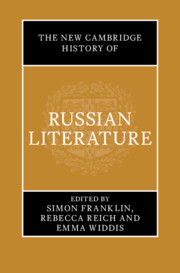Book contents
- The New Cambridge History of Russian Literature
- The New Cambridge History of Russian Literature
- Copyright page
- Contents
- Figures
- Contributors
- Acknowledgements
- On Transliteration, Names, and Dates
- Introduction
- History 1 Movements
- History 2 Mechanisms
- History 3 Forms
- 3.1 Forms before Genres
- 3.2 Folk Genres
- 3.3 Verse I
- 3.4 Drama I
- 3.5 The Novel I
- 3.6 The Short Story
- 3.7 Drama II
- 3.8 Verse II
- 3.9 The Novel II
- 3.10 Self-Writing
- 3.11 (Plat)forms after Genres
- Boxes 5 Critical Frames
- Boxes 6 Literature beyond Literature
- History 4 Heroes
- Index
- References
3.11 - (Plat)forms after Genres
from History 3 - Forms
Published online by Cambridge University Press: 31 December 2024
- The New Cambridge History of Russian Literature
- The New Cambridge History of Russian Literature
- Copyright page
- Contents
- Figures
- Contributors
- Acknowledgements
- On Transliteration, Names, and Dates
- Introduction
- History 1 Movements
- History 2 Mechanisms
- History 3 Forms
- 3.1 Forms before Genres
- 3.2 Folk Genres
- 3.3 Verse I
- 3.4 Drama I
- 3.5 The Novel I
- 3.6 The Short Story
- 3.7 Drama II
- 3.8 Verse II
- 3.9 The Novel II
- 3.10 Self-Writing
- 3.11 (Plat)forms after Genres
- Boxes 5 Critical Frames
- Boxes 6 Literature beyond Literature
- History 4 Heroes
- Index
- References
Summary
Ever since the 1960s, Russophone professional and lay authors have been leaving the printed page and climbing onto other – and, with time, online – platforms, and pairing words with (moving) images with fervour. How should we define their activities? How should we assess their visual and digital experiments? Can a social-media entry in verse by a poet be considered literature? To what extent can the text-oriented tools of traditional literary studies help us unpack GIF-laden online stories? And how do understandings of literature as a highbrow cultural practice help us to understand social-media odes to classics by teenagers? This chapter follows the forms that Russophone literary activities have taken beyond print outlets, paying special attention to digital-writing forms. It surveys literary production across websites, social media, and other digital platforms from the mid−1990s to the early 2020s by authors including Olia Lialina, Roman Leibov, Linor Goralik, Dmitrii Vodennikov, and Galina Rymbu.
- Type
- Chapter
- Information
- The New Cambridge History of Russian Literature , pp. 643 - 657Publisher: Cambridge University PressPrint publication year: 2024

